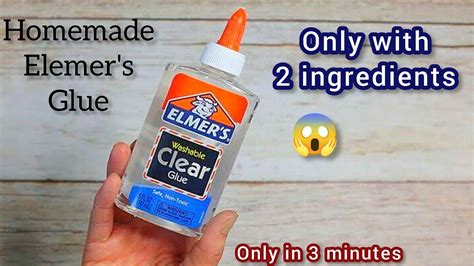The world of adhesives is vast and diverse, with various types of glues serving different purposes. Among these, clear glue stands out for its unique properties and applications. Clear glue, also known as white glue when it's in its initial state before drying, is a type of adhesive that dries clear, making it ideal for projects where visibility of the adhesive is undesirable. It's widely used in crafts, DIY projects, and even in educational settings due to its ease of use and non-toxic nature.
Properties and Applications of Clear Glue

Clear glue is known for its flexibility, strength, and ability to bond a wide range of materials, including paper, fabric, and plastics. It’s particularly popular in schools for art projects because it’s easy to clean up and dries quickly. Additionally, clear glue is used in the manufacturing of certain types of paper products and in the textile industry for bonding fabrics together. Its clear drying property makes it especially useful for applications where the adhesive should not be visible, such as in bookbinding, scrapbooking, and other paper crafts.
Types of Clear Glue
There are several types of clear glues available, each with its own set of characteristics and uses. For instance, there’s the traditional white glue that dries clear, often used in schools and for household crafts. Then, there are more specialized types, such as epoxy resin, which provides a very strong bond and is often used in woodworking and for bonding metals and glass. Another type is cyanoacrylate, commonly known as super glue, which dries very quickly and is used for plastics, metals, and other materials. Each type of clear glue has its own advantages and is chosen based on the specific requirements of the project at hand.
| Type of Glue | Characteristics | Common Uses |
|---|---|---|
| PVA Glue (White Glue) | Dries clear, flexible, non-toxic | Paper crafts, schools, DIY projects |
| Epoxy Resin | Very strong, resistant to heat and chemicals | Woodworking, metal bonding, glass repair |
| Cyanoacrylate (Super Glue) | Dries quickly, strong bond | Plastics, metals, rapid repairs |

Key Points
- Clear glue is versatile and can be used on a variety of materials, including paper, fabric, and some plastics.
- The choice of clear glue depends on the specific requirements of the project, including the need for flexibility, strength, and resistance to environmental factors.
- Clear glue is widely used in crafts, education, and industry due to its ease of use and the clarity of the dried adhesive.
- Understanding the different types of clear glues, such as PVA glue, epoxy resin, and cyanoacrylate, is crucial for selecting the right adhesive for a project.
- Clear glue can be used for both functional and decorative purposes, making it a valuable addition to any craft or DIY toolkit.
In conclusion, clear glue is a valuable tool for both hobbyists and professionals, offering a range of applications across different industries and projects. Its ability to dry clear, combined with its strength and flexibility, makes it an indispensable adhesive for many uses. Whether you're working on a school project, a DIY home repair, or a complex industrial application, understanding the properties and applications of clear glue can help you achieve the best results.
What is the most common use of clear glue?
+The most common use of clear glue is in crafts and DIY projects, particularly those involving paper, fabric, and other lightweight materials. It’s also widely used in educational settings for art projects and other activities.
How do I choose the right type of clear glue for my project?
+Choosing the right type of clear glue involves considering the materials you are working with, the strength of bond required, and any environmental factors the bonded items will be exposed to. For example, if you need a strong and waterproof bond, epoxy resin might be the best choice.
Is clear glue suitable for outdoor use?
+It depends on the type of clear glue. Some types, like epoxy resin, are more resistant to water and extreme temperatures, making them suitable for outdoor use. However, standard PVA clear glue may not withstand outdoor conditions well and could degrade over time when exposed to sunlight and moisture.



